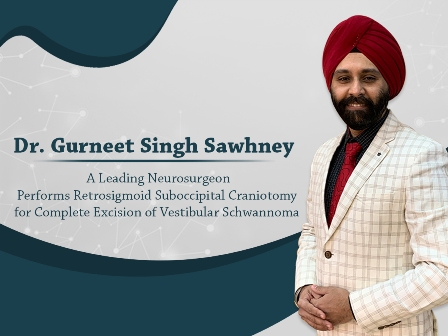
Advancements in neurosurgery have made it possible to treat critical and complicated neurological disorders in much precise and accurate manner. Currently, neurosurgery offers renewed hope to patients who have been diagnosed with brain and spine disorders which could have been limited due to human limitations.
With minimally invasive procedures and intraoperative neuromonitoring, it is possible for the treating neurosurgeon to access and reach the innermost layers and sections of the brain and spine and treat them in much precision and accuracy. Also, these highly advanced surgical techniques ensure small sized incisions, less blood loss facilitating fast recovery and minimal post-operative trauma.
Dr. Gurneet Singh Sawhney, one of the best neurosurgeon in Mumbai states that brain disorders that could require surgery are brain tumors, vascular malformations, intracerebral bleeds, epilepsy, and so on. The surgeon determines the need for surgery especially if the disorder is likely to affect the patient’s quality of life or lead to further medical complications.
As mentioned earlier, neurosurgeries are complicated and critical. Their outcome depends upon various factors such as the type of disorder, the location of the brain where the surgery is performed, and procedure of the surgery and of course, the expertise of the treating neurosurgeon.
Since 2017, Dr. Gurneet Singh Sawhney is a Senior Consultant Neurosurgeon, at Fortis Hospital, Mulund in Mumbai. His varied experience includes conducting complex neurosurgical procedures using advanced neurosurgical intraoperative techniques for best outcomes.
Dr. Gurneet Singh Sawhney, a leading neurosurgeon in India shares a patient story suffering from right vestibular schwannoma and how her health was restored after he performed a Retrosigmoid Suboccipital Craniotomy and Microsurgical Tumor Excision.
He stated, ‘Last year, a 32 YO air hostess approached me with complaint of right sided hearing loss and imbalance while walking. On further diagnosis, it was revealed that she had right vestibular schwannoma. Her brain MRI revealed a large tumor arising from her right side vestibular cochlear nerve or the hearing nerve which was compressing on her brain stem’. The best solution to resolve her condition was to remove it surgically.
Dr. Gurneet Singh Sawhney conceded that the biggest challenge in this surgery was to preserve the facial nerve or else the patient would have a drooping paralysed face throughout her life. Upon her consent, he performed a right retrosigmoid suboccipital craniotomy and microsurgical tumor excision under intraoperative neuromonitoring. The surgery was successful and the facial nerve was preserved as desired.
A year after the surgery, the patient visited Dr. Gurneet Singh Sawhney for a check-up and he was very happy to see her looking confident with a glorious smile on her face. Moreover, her MRI too was clear with no residual tumor in her brain.
Dr. Gurneet Singh Sawhney states that retrosigmoid suboccipital craniotomy is performed to treat vestibular schwannomas, cranial nerve shwannomas, trigeminal neuralgia, hemifacial spasm, congenital lesions, and other conditions in the occipital area of the brain.
In this case, the patient had a schwannoma in her hearing nerve and it was causing brainstem compression and hence it had to be excised. Generally, vestibular schwannomas or neuromas are non-cancerous, and hence once removed, the patient is considered cured. He elaborates that retrosigmoid suboccipital craniotomy is a procedure in which the brain is accessed by making a cut into the skull behind the ear. The vestibular schwannoma is removed and the bone flap is securely restored to its original position using screws and plates. In this surgery, a part of the occipital bone located behind the ear is removed in order to access the vestibular schwannoma and remove it.
Dr. Gurneet Singh Sawhney sought assistance with neuromonitoring during the surgery to avoid damaging the cochlear nerve or the hearing nerve. Neurosurgeons seek intraoperative neuromonitoring, a highly advanced technique to identify normal functioning brain and spinal cord to prevent irreversible damage. Similarly, it helps to identify sensorimotor cortex and other anatomical structures which perform vital sensory functions while the surgery is underway.
Dr. Gurneet Singh Sawhney is a prolific, multi-linguist, and dynamic neurosurgeon in Mumbai. He is available at many centrally located clinics and hospitals across Mumbai. Interested patients and their family members can always reach out to him or seek his appointment at +91 8104310753.